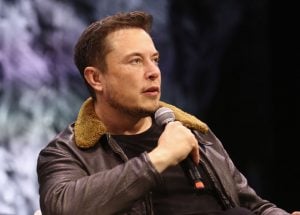Republicans Are Mad The FCC Rejected Elon Musk’s Attempt To Get A Billion Dollars In Subsidies To Deliver Pricey Satellite Broadband To Some Traffic Medians
Always the victim.

(Photo by Diego Donamaria/Getty Images for SXSW)
You might recall that Elon Musk claims to hate taxpayer subsidies. They should all be “deleted.” Except for the subsidies given to his companies (often for doing nothing), of course.
Back in 2020, Musk’s satellite broadband venture, Starlink, gamed a Trump-era FCC subsidy program to try and grab $886 million in taxpayer dollars. It was a deal consumer groups noted was a huge waste of money, because the proposal itself — which involved bringing expensive satellite broadband to places like airport parking lots and traffic medians — clearly wasn’t the best use of taxpayer funds.

AI’s Impact On Law Firms Of Every Size

The Biden FCC noted the problems with the application and forced Starlink to re-apply. After some whining Starlink did, but was then rejected again by the FCC last year. The FCC stated that they weren’t sure Starlink could meet program speed goals consistently due to growing congestion and slowing speeds on the over-saturated network.
They also expressed concerns that the service might not be affordable to the heavily rural, lower income users most in need of help. Starlink requires a $600 up front equipment fee and costs $110 a month, and data consistently shows that affordability is a key obstacle to broadband adoption.
So this week, the FCC formally finalized its rejection of Starlink’s attempt to grab a billion dollars to deliver satellite broadband to some parking lots:
“The FCC is tasked with ensuring consumers everywhere have access to high-speed broadband that is reliable and affordable. The agency also has a responsibility to be a good steward of limited public funds meant to expand access to rural broadband, not fund applicants that fail to meet basic program requirements,” said Chairwoman Jessica Rosenworcel. “The FCC followed a careful legal, technical and policy review to determine that this applicant had failed to meet its burden to be entitled to nearly $900 million in universal service funds for almost a decade.”
Sponsored

Law Firms Now Have A Choice In Their Document Comparison Software

AI’s Impact On Law Firms Of Every Size


Gain An Instant Understanding Of New Complaints With LexisNexis Snapshot

Why Do AI And Legal Professionals Make The Perfect Partnership?

The FCC made the right call. It makes much more sense to spend those subsidies to extend affordable, faster, and more reliable fiber access as far as possible, with 5G and fixed wireless filling in the gaps.
Starlink is nice for folks with absolutely no other options who can afford it, but we’ve noted repeatedly that it lacks the capacity to truly scale. The service only has around 1.5 million subscribers worldwide (far less than the 20 million Musk promised investors it would have by this point). It’s a rural niche option whose importance is routinely overstated in stories (like this latest story at the Nation).
For context, somewhere between 20 and 30 million Americans lack access to broadband. Another 83 million (as of 2020) live under a broadband monopoly. Even with its full suite of low-Earth orbit satellites in space a few years from now, Starlink will barely make a dent in the underlying problem. And that’s before you get to the whole ruining astronomical research thing.
But, of course, Republicans like the FCC’s Brendan Carr are already throwing hissy fits because the Biden FCC refused to waste a billion dollars in taxpayer subsidies on an expensive service that doesn’t scale. Carr, as is his way, took a very valid rejection of a wasteful proposal, and distorted it into a narrative where the government is somehow being particularly unfair to Elon Musk:

Sponsored

Diving Into Generative AI: A Practical Guide For Law Firms Starting From Scratch

Why Do AI And Legal Professionals Make The Perfect Partnership?

Even Elon’s mommy popped up to complain that the mean old government is being mean because it refused to give her son a billion dollars for no coherent reason:

It’s worth pointing out that Musk’s company certainly wasn’t alone in trying to game this particular program (the Rural Digital Opportunity Fund, or RDOF) with the Trump FCC and Brendan Carr’s help. The Biden FCC has had to come in and clean up the mess, suing numerous companies that tried to mislead the agency to grab taxpayer money for services they couldn’t actually deliver. All under Carr’s watch.
In fact the Trump FCC and Carr screwed up this particular subsidy program so badly, that when it came time to dole out $42 billion in infrastructure bill broadband funds, the Biden administration leapfrogged the FCC and put the NTIA in charge of managing much of it instead because they no longer trusted the agency’s reputation or competency. So Carr whining about the end result is particularly exhausting.
Again, the Biden FCC (which I criticize frequently and extensively) made the right call here technically and logistically. But Musk and his loyal Republican color guard are already busy reframing this as some kind of seedy personal government vendetta against Musk across the growing right wing propaganda echoplex.
More Law-Related Stories From Techdirt:
The Day Ted Cruz Stopped A Bad Internet Bill
Things That Make No Sense: Epic Lost Its Fight Over Apple’s Closed iOS Platform, But Won It Over Google’s More Open Android Platform
How the Grinch’s Intellectual Property Stole Christmas








